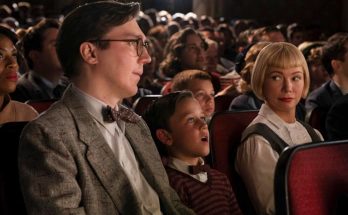Our current subscribers will gather together at Aurora Film Society’s September outdoor event to choose films for our 2025 series.
If you are not currently a suscriber, please check out the films below and become a member! You will find a ‘Subscribe’ tab on our homepage. You may contact us via email if you have any questions.
Closely Watched Trains
[1966 / Jiří Menzel / 92 minutes]
At a village railway station in occupied Czechoslovakia, a bumbling dispatcher’s apprentice longs to liberate himself from his virginity. Oblivious to the war and the resistance that surrounds him, this young man embarks on a journey of sexual awakening and self-discovery, encountering a universe of frustration, eroticism, and adventure within his sleepy backwater depot.
The Crime Is Mine
[2023 / François Ozon / 102 minutes]
“The Crime is Mine,” a snappy showbiz screwball, takes feminist conceit and adds stardust and firecrackers to the mix. Directed by François Ozon, the film puts a twist on the trope of the spotlight-seeking murderess: the women in the film want us to know they did it. Freely adapted from a 1934 play by Georges Berr and Louis Verneuil and set in a vintage Paris, the film revolves around the roommates Madeleine and Pauline, two dead-broke ingénues angling for a break. In the opening scene, Madeleine, a blonde bombshell who dreams of her name in lights, comes home distraught after a slimy theater producer Montferrand attempts to rape her. And Madeleine’s beau, a Buster Keaton look-alike, announces his plans to marry a wealthy heiress and keep Madeleine as his mistress. Hours later, the cops swing by — Montferrand is dead and the revolver on Madeleine’s dresser looks awfully fishy.
The Farewell
[2019 / Lulu Wang / 100 minutes]
Billi, a Chinese American young woman and her family travel to China to visit her grandmother. Grandma is the only one who doesn’t know the trip is because her doctor has told on of her son’s that she is close to death. There is predictably a clash of cultures, words of wisdom and lessons learned in this comedy/drama. The unique cultural circumstances none-the-less produce a family saga with universal appeal.
Rap artist, Akwafina, in her first starring role, won a Golden Globe award for her portrayal of Billi.
Gallipoli
[1981 / Peter Weir / 110 minutes]
This Australian film directed by Peter Weir is a story of a World War I campaign waged by Australian troops in Turkey during the summer of 1915. Weir has stated: “Gallipoli is about two young men on the road to adventure; how they crossed continents and great oceans, climbed the pyramids and walked through the ancient sands of Egypt and the deserts of the outback to their appointment with destiny.” In other words, this film portrays how World War I affected the little people, rather than how it was molded and shaped by great leaders and vast impersonal forces.
Hiroshima, Mon Amour
[1959 / Alain Resnais / 90 minutes]
A married French actress, who is shooting a film in Hiroshima, has a one night stand with a handsome married Japanese architect. The morning after he says he wants to see her again. She says that is impossible because she is finishing her part of the film that day and is returning to France the following morning. However, he pursues her all day during which she reveals how being surrounded by the memorials and ruins caused by the bomb have moved her deeply and have revived her own memories of the war in France. My takeaway is that one’s self cannot be separated from one’s place of origin.
Infernal Affairs
[2002 / Andrew Lau / 101 minutes]
Two of Hong Kong cinema’s most iconic leading men, Tony Leung Chiu-wai and Andy Lau Tak-wah, face off in the breathtaking thriller that revitalized the city-state’s twenty-first-century film industry, launched a blockbuster franchise, and inspired Martin Scorsese’s “The Departed”. The setup is diabolical in its simplicity: two undercover moles— a police officer (Leung) assigned to infiltrate a ruthless triad by posing as a gangster, and a gangster (Lau) who becomes a police officer in order to serve as a spy for the underworld—find themselves locked in a deadly game of cat and mouse, each racing against time to unmask the other. As the shifting loyalties, murky moral compromises, and deadly betrayals mount, “Infernal Affairs” raises haunting questions about what it means to live a double life, lost in a labyrinth of conflicting identities and allegiances.
The Long Good Friday
[1980 / John Mackenzie / 114 minutes]
A combustible performance from Bob Hoskins is the fuse that lights this underworld saga, a landmark of British crime cinema. Hoskins plays Harold Shand, an ambitious London mobster who, just as he attempts to close a major real-estate deal with the American Mafia, finds his crime empire rocked by a string of attacks, sending him on a ruthless quest to find out who’s responsible. Abetted by an ice-cool performance from Helen Mirren as Shand’s in-command moll, “The Long Good Friday” is not only a gripping gangster thriller but also a vivid portrait of late-1970s Britain —a powder keg of cultural and political tensions on the verge of explosion.
Lucky
[2017 / John Carroll Lynch / 88 minutes]
Nothing much happens in “Lucky,” and then everything does. That doesn’t mean this leisurely portrait of its title character, a cantankerous old coot (Harry Dean Stanton, in one of his last roles), is any more eventful at the end than at the beginning. Rather, the accumulation of spot-on performances and long-familiar faces, small-town routines and dusty-worn locations, finally coalesces into a picture that’s greater than the sum of its oft-clichéd parts.
We’ve seen him stride through arid desert towns like this before, though now, as Lucky, his gait is more fragile if no less purposeful. Following the same daily routine — an unvarying trek from home to diner to bodega to bar — Lucky would rather watch game shows than engage in small talk. The townsfolk don’t seem to mind, and are even quite fond of him, in the way of longtime owners of a rather surly pet.
Then, one day, he falls down, and the film subtly shifts from a quietly comical character study to a delicate reflection on loneliness and mortality.
Moonlighting
[1982 / Jerzy Skolimowski / 97 minutes]
Nowak (Jeremy Irons), a Polish contractor, leads a group of workmen to London so they can provide cheap labor for a government official based there. Nowak must manage the project and the men as they encounter the temptations of the West and loneliness and separation from their families. Nowak is the only one of the group who speaks English, and he uses this as a tool over his team. When the unrest in Poland leads to a military takeover, Nowak is faced with a much more difficult situation than he expected.
My Man Godfrey
[1936 / George La Cava / 95 minutes]
During the Great Depression, Godfrey Smith lives with other homeless men at a New York City dump in a Hooverville by the East River. One-night, spoiled socialite Cornelia Bullock offers him $5 to be her “forgotten man” for a scavenger hunt. Godfrey refuses and makes Cornelia retreat and fall on a pile of ashes, much to the glee of her younger sister Irene. Godfrey finds Irene to be kind and offers to go with her to help her beat Cornelia and satisfy his curiosity regarding their scavenger hunt.
Godfrey becomes a butler in the Bullock home. Irene Bullock falls in love with Godfrey and calls off her engagement to her fiancée. Against the backdrop of the immense wealth of the Bullock’s and their set Godfrey is a stark contrast of decency and kindness. It is revealed that Godfrey is not defined by the social situation he was found in, and he winds up helping the Bullock’s and his friends in the homeless encampment.
In 1999, the film was deemed “culturally significant” by the United States Library of Congress and selected for preservation in the National Film Registry. In 2000, the film was ranked #44 on the American Film Institute’s list of the 100 funniest comedies, and Premiere voted it one of “The 50 Greatest Comedies of All Time” in 2006.
It was nominated in 1937 for Best Director, Actor, Actress, Supporting Actor, Supporting Actress and Adapted Screenplay but failed to win any awards. Roger Ebert gave the movie 4 stars and loved the cinematography.
The Outfit
[2022 / Graham Moore / 106 minutes]
A throwback to an older style of movie thrillers in which the majority of the menace is implied instead of shown, “The Outfit” takes place mostly over one night in a Chicago tailor’s shop during Christmastime, 1956. Sir Mark Rylance plays Leonard the tailor, or rather the cutter; he was trained by the leading lights of Savile Row, and he takes umbrage with being called a mere “tailor”. Leonard is a quiet, reserved, middle-aged Englishman who plies his trade smack in the middle of a neighborhood controlled by the Irish mob. Boss Roy Boyle (Sir Simon Russell Beale) uses Leonard’s shop as a dead drop for the weekly protection money his hoods squeeze from the local businesses, but Boyle is also one of Leonard’s best customers, so he looks the other way. Boyle’s son, Richie, and Boyle’s loyal lieutenant, Francis, drop and pick up cash at the shop several times a week. Richie is also dating the shop’s receptionist, Mable (Zoey Deutch), who is the only person on earth Leonard actually cares about, another reason why he doesn’t make waves with the Boyle Mob.
After a surprise gunfight with the LaFontaines, an upstart Caribbean gang trying to muscle into Boyle’s territory, Francis drags a badly-wounded Richie to the shop in the middle of the night and forces Leonard to “stitch him up” and hide a mysterious briefcase snatched from the scene. Boss Boyle himself arrives at the shop and quickly deduces that there’s an informer in their ranks when he discovers the briefcase contains a plethora of FBI wiretaps and extremely incriminating evidence that could bring down not just Boyle’s gang but the whole of Al Capone’s national syndicate “The Outfit”.
When questioned about all this, Leonard assumes the phrase “The Outfit” is simply referring to fashionable garments, but it’s clear to us in the audience that Leonard is quite a bit more clever and knowledgeable on these matters than he lets on. One of the great pleasures of this film is watching how Leonard over the course of the night slowly reveals his own layers of cunning, something he’ll need every bit of in order to survive this ordeal and keep Mable out of harm’s way. “The Outfit” depicts a fascinating game of twists and reversals, but it’s Rylance’s brilliant slow-burn characterization of Leonard that imbues the film with its true heart.
Paper Moon
[1973 / Peter Bogdanovich / 102 minutes]
Con man Moses Pray (Ryan O’Neal) had hoped to merely pay his last respects to a fun-loving gal when fellow mourners decide it’d only be right for him to take her young, now-orphaned daughter to some relatives in Missouri. Seeing as they’ve got this Depression on, he’s heading that way and, after all, you can trust a man who sells Bibles, his con has left him little room to decline. For her part, Addie (Tatum O’Neal) isn’t exactly obstinate, nor is she particularly accommodating. But she is a lot sharper than she appears. When Mose (he goes by “Mose”) takes her along to a sales pitch, she quickly discovers his ruse, and discovers even quicker how to bolster his operation to their mutual advantage. They are, it turns out, a perfect team.
Pather Panchali
[1955 / Satyajit Ray / 125 minutes]
A family of four struggles with poverty in their crumbling rural house, which is the ancestral home of the father’s family. The father always has a scheme for making more money, which never quite works out. The mother has become bitter from the constant worry and deprivation. She feels deeply the criticism from neighbors when her daughter picks fruit from the neighbor’s orchard. She is cruel to the ancient “auntie” who lives with them, resenting the small amount of food she eats. Somehow, the son and daughter are fairly happy free-range children. However, a number of disasters occur and the father finally agrees to leave his ancestral home and move to Benares in hopes of a change in luck.
Watch the trailer for Pather Panchali here: https://www.youtube.com/watch?v=KQ7l3SFA0Rs
Purple Noon
[1960 / René Clément / 117 minutes]
Alain Delon was at his most impossibly beautiful when “Purple Noon” was released and made him an instant star. This ripe, colorful adaptation of Patricia Highsmith’s vicious novel “The Talented Mr Ripley”, directed by the versatile René Clément, stars Delon as Tom Ripley, a duplicitous American charmer in Rome on a mission to bring his privileged, devil-may-care acquaintance Philippe Greenleaf (Maurice Ronet) back to the United States. What initially seems a carefree tale of friendship soon morphs into a thrilling saga of seduction, identity theft, and murder. Featuring gorgeous location photography of coastal Italy, “Purple Noon” is crafted with a light touch that allows it to be at once suspenseful and erotic, and it gave Delon the role of a lifetime.
Salt Of The Earth
[1954 / Herbert J Biberman / 94 minutes]
Salt of the Earth is a dramatization of a real labor union strike in New Mexico, made by a handful of blacklisted actors and filmmakers with the cast rounded out by actual miners. Along the way, the filmmakers had to contend with the locals sabotaging their shoots, labs refusing to process their film, pushback from the cast about the script, and the lead actress getting deported. It wasn’t screened anywhere in the US upon its release since the projectionists’ union refused to run it. (On the other hand, it is the only American film to be screened in China during Mao Tse-Tung’s time in office.)
The film was inspired by an actual strike that took place in a mine in New Mexico where Latinx miners were being treated quite differently from the Anglo ones. Their pay was lower, they had separate locker rooms and canteens, their facilities were sub-standard. Their wives were also complaining that the company housing provided to the Latinx workers had no indoor plumbing. In the film, much of this is dramatized through its impact on one family – Ramon and Esperanza Quintero, and their three kids.
Ramon doesn’t want Esperanza to show up by the picket line with the other women when the men go on strike; he only relents when he learns that none of the other women make coffee as well as she can. Esperanza comes to relish being part of the movement – so much so that when the factory files an injunction ordering that any striking miners would be arrested immediately, she’s one of a small group of women pointing out that the injunction says nothing about arresting miners’ wives if they start a picket line. Which they’d be happy to do.
A Soldier’s Story
[1984 / Norman Jewison / 101 minutes]
Combining mystery, history, sociology and inquiry into the psychopathology of hatred and the poison of accommodation to injustice, Charles Fuller’s Pulitzer Prize-winning ”Soldier’s Play” has been translated to the screen under the title ”A Soldier’s Story.”
Directed by Norman Jewison (”In The Heat Of The Night”) and employing not only the playwright as screenwriter but also the talents of many of the cast from the Negro Ensemble Company production that introduced the play in 1981, ”A Soldier’s Story” proves once again to be tense drama.
By all indications, Mr Jewison has remained faithful to the sturdy carpentry of the original, erected on a foundation of murder and rising to its climax on a structure of alternating investigative interrogations and flashbacks that satisfy justice by exposing those who committed the crime and serve humankind by illuminating its deeper causes.
Mr Fuller’s story takes place during World War II, at an Army base in Louisiana, where Vernon Waters, a black platoon sergeant, has been shot to death with a .45 caliber automatic while returning drunk to the base one night.
Songs My Brothers Taught Me
[2015 / Chloé Zhao / 98 minutes]
This is an Indie film developed at the Sundance Institute workshop and film on Pine Ridge Reservation in western South Dakota.
The story centers on the relationship of a teen boy and his younger sister. Veteran, Native actress, Irene Bedard plays the mom of Jashaun and John.
John plans to go to LA after High school graduation, hoping for a chance at a life without crime, violence, addiction and fractured families. Yet he also dreads what will happen to his sister if he leaves her behind.
The Swimmer
[1968 / Frank Perry & Sydney Pollack / 95 minutes]
Ned Merrill (Burt Lancaster) shows up at the home of old friends wearing only swim trunks and asks to swim in their pool. They are happy to see him as it has been a while. They invite him to have a drink and talk, which he does for a bit. Then he jumps in the pool to swim a lap. He looks across a valley and realizes that he knows all the people between this spot and his home. He also realizes that they all have pools. He announces his plan to swim home. At most of the pools he receives a drink, but the closer he gets to home, the less welcome his presence is and we, the audience, learn bit by bit some of the back story. He started his journey happy and physically fit, but as the day wears on he is rejected, humiliated, confused and his strength is slowly sapped. When he finally reaches home, he is mentally and physically completely undone.
At age 52, Lancaster was either very brave or a complete egomaniac to tell this odd story wearing only swim trunks (and at one pool, wearing even less). Lots of cameos, including a very young, kind of cute Joan Rivers.
The Third Man
[1949 / Carol Reed / 93 minutes]
Set in postwar Vienna, Austria, “The Third Man” stars Joseph Cotten as Holly Martins, a writer of pulp Westerns, who arrives penniless as a guest of his childhood chum Harry Lime (Orson Welles), only to find him dead. Martins develops a conspiracy theory after learning of a “third man” present at the time of Harry’s death, running into interference from British officer Maj. Calloway (Trevor Howard) and falling head-over-heels for Harry’s grief-stricken lover, Anna (Alida Valli).



